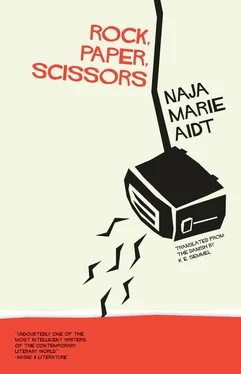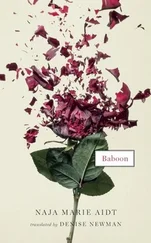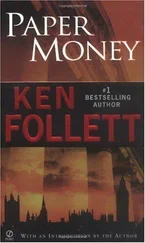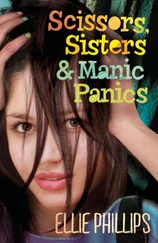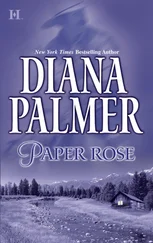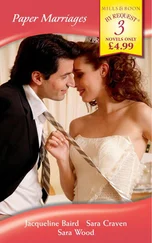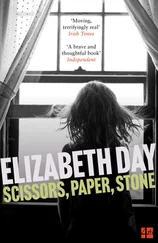“Celan,” Thomas says, interrupting him. “But I don’t know the name of the poem, or what year it’s from. I just recognize the tone.”
“‘All Souls.’ From Language Mesh , 1959,” Luke says before Thomas has completed his thought. “Your turn.”
Luke’s eyes radiate heat. Thomas can smell his breath. Once again there’s this jasmine-like fragrance in it, almost like a sweet tea in the midst of something fusty and sharp. Thomas can’t remember a single strophe of anything at all. The only thing he knows is Celan’s “Death Fugue,” and that’s too easy. Luke would guess it at once. Shakespeare, he thinks. Come on, remember some lines of a sonnet. Or Dickinson. Dickinson or Rilke. Lorca. Luke waits patiently. He drinks his beer and ashes his cigarette. He leans back on the bench and turns to face the storm, the night. But Thomas doesn’t know Emily Dickinson, Lorca, or Rilke by heart. And why would he? He’s read very little poetry, and then mostly because the small volumes are often beautiful, and published on first-rate paper. He’s caressed the books more than he’s read them. The font type, the margins, the paper’s weight, the cover design — this is what he looks at. There’s nothing left for him to do but give up and utter a few lines of “Death Fugue.” But not the first lines. There’s a microscopic chance that Luke won’t remember the entire poem. He clears his throat. Luke gives him an encouraging look, then smiles. A small, kind smile. And Thomas focuses on the sight of the poem, the way he sees it on his shelf at home. Imagining it, he scans the page in his mind. Then he says: “ He calls out jab deeper into the earth you lot you others sing now and play / he grabs at the iron in his belt he waves it his eyes are blue / jab deeper you lot with your spades. . ” Thomas can’t remember any more. “ Jab deeper you lot with your spades. . ” Thomas sputters to a halt. A smile spreads across Luke’s face, exposing his teeth. “ You others play on for the dance ,” Luke continues, nodding; he’s enjoying this very much, apparently. “That was easy,” he says. “Paul Celan’s ‘Death Fugue.’ Poppy and Memory, 1952 .”
And on and on it goes, Thomas gives up, Luke recites indefatigably. Once in a while Thomas guesses correctly, but most of the time he’s wrong. And usually it’s the poets’ surnames he gets right, not the titles, not the given names, not the publication dates. Luke seems to expand on the bench, filling more and more, he seems kinder, more animated. Meanwhile, Thomas’s headache gets worse.
“Do you even understand the meanings of the poems that you know by heart?” Thomas asks at one point. Luke shrugs and pops open another beer. “That’s not important. What’s important is knowing them. Almost like counting sheep when you can’t sleep.”
“What do you mean by that?”
“I don’t really know. I’ve just learned them. Jacques made me practice when we were fishing. It was a kind of sport to him. Sometimes he would tell me that his head swarmed with poems, as if they plagued him. Other times they made him. .” Luke sighs, wrapping the blanket tighter around him.
“What? In good spirits? Happy?”
“I don’t know.” Luke stares straight ahead. “But I think so. In prison he always crammed poetry. When I visited him, the first thing he’d asked was whether I’d learned this or that suite, and whether I’d brought this or that book for him. We had a kind of. . fellowship with the poems.” Luke breathes slowly, in and out, from deep within his belly. “It was something we shared — even when he was in prison and we couldn’t fish or anything.”
“Strange,” says Thomas. “Fucking strange.” He shakes his head and swigs the last of his lukewarm beer.
“Are you tired?” All at once Luke sounds gentle and jittery. But he doesn’t look nervous. Only happy. Big and happy and gracious.
“We can do a few more,” Thomas says. He doesn’t want to disappoint him. Luke gathers himself and closes his eyes. For a moment, he seems like a sprinter waiting for the official to fire the starter’s gun. Extremely present and alert, but at the same time mentally withdrawn, into his body. “ Why, if this interval of being can be spent serenely / in the form of a laurel, slightly darker than all / other green, with tiny waves on the edges / of every leaf (like the smile of a breeze)—: why then / have to be human — and, escaping from fate, / keep longing from fate?. . / oh not because happiness exists, / that too-hasty profit snatched from approaching / loss.”
Since Thomas doesn’t stop him, he keeps going. Thrusting the words, rhythmic and strong. Rocking back and forth. Lifting his head and lowering it. Thomas gets goose bumps and feels a sudden tenderness for the young man beside him, so vulnerable suddenly, or so it seems, but maybe he’s wrong. “Look, I am living. On what? Neither childhood nor future grows any smaller. . superabundant being / wells up in my heart.”
They fall silent. Listening to the wind. A lucid thought pierces Thomas: Is he my brother? The notion startles him. Is Luke my brother? Is that it? Luke — exhausted, quizzical, but also proud — looks at Thomas.
“Applause,” Thomas says, carefully touching Luke’s shoulder. “Not too many can do what you do. Rilke. It must be one of the elegies, but which one? I haven’t a clue.”
“The ninth.”
They smoke another cigarette. Luke tucks his legs underneath him and hugs his knees. The cigarette glows and the lights flicker. Thomas regards Luke. They don’t at all look alike. Except in height. What if he’s my brother ? Warm and cold, his lungs floating behind his ribs, as if there was suddenly all too-much air in them. “Rilke,” Thomas says. “They say you’ll need to spend your entire life studying his work if you really want to understand him.” Luke doesn’t comment on that. He’s oddly distant now. Outside it sounds as though the wind has transformed into one large, greedy mouth.
“Well,” Thomas says, “It’s almost bedtime for me. Aren’t you getting up early to fish? Or have you changed your mind?”
Luke will go fishing. Thomas stands. But it’s as if Luke’s consciousness returns to the situation and the sunroom. With renewed energy, he insists on reciting yet another poem. The goodnight poem, he calls it. Against his better judgment, Thomas returns to the bench, swaddling himself in the blanket. He’s had enough poetry. And this new, nagging idea — that Luke could be Jacques’s son — careens in him like confusing, off-key notes. Luke’s different now, freer, and it’s obvious that he knows this poem from beginning to end, and could probably recite it in his sleep.
“ We two, how long we were fool’d / Now transmuted, we swiftly escape as Nature escapes, / We are Nature, long have we been absent, but now we return, / We become plants, trunks, foliage, roots, bark. . ” And a little further along in the text: “ We are two fishes swimming in the sea together / We are what locust blossoms are, we drop scent around lanes / mornings and evenings. . ” Thomas eyes Luke. Luke’s face opens, his jaw slackens, his eyes looking calmly ahead, his left hand keeping rhythm, tranquilly tapping the arm of the bench. Thomas allows him to repeat the entire poem. At last Luke turns to him, and his voice is deep and hot in Thomas’s ear. It feels as though Luke’s eyes are boring right into his brain, but there’s also a question behind them, a kind of prayer, almost: “ We are snow, rain, cold, darkness, we are each product and / influence of the globe, / We have circled and circled till we have arrived home again, we two, / We have voided all but freedom and all but our own joy .” When Luke is finished, it’s quiet. But he continues to stare. Thomas hears Luke’s breathing, even imagines he hears his heart beating. Suddenly it’s all too much. Too intimate. Too constricting, as if both the poem and Luke’s gaze were an invitation written in invisible ink; is that what he’s saying? Thomas thinks, shifting in his seat. Is he telling me we’re brothers with that poem? It’s unreal and strangely obvious at the same time. “Very nice,” he says. “Who is it?” Finally Luke draws his face back.
Читать дальше
